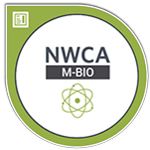PURPOSE
The Microbiology credential documents the essential competencies for general microbiology topics.
AUDIENCE
This credential is appropriate for microbiologists, agricultural and food scientists, biochemists, biological technicians, chemical technicians, medical and clinical laboratory technologists and technicians, medical scientists, natural sciences managers, secondary and post-secondary teachers who teach biological sciences, zoologists and wildlife biologists and related fields
JOB/CAREER REQUIREMENTS
The microbiologists must have a solid foundation in basic chemistry, microscopy, cell anatomy and physiology, and microbial growth and metabolism. They must understand how microorganisms are classified and identified. Additionally, they must understand the principles of disease and immunity and how microorganisms are involved in animal and human Diseases and impact the environment, agriculture, and the food industry.
MICROBIOLOGY WORKPLACE TASKS:
- Microbiologists and related technicians plan and conduct research projects related to microorganisms, disease, drugs, pest control, etc.
- Microbiologists and related technicians isolate and maintain cultures of microorganisms for study.
- Microbiologists and related technician identify and classify microorganisms found in specimens collected from humans, plants, animals, and the environment.
- Microbiologists and related technicians monitor how microorganisms impact other living organisms, including humans, wildlife, livestock, and the environment.
- Microbiologists and related technician assist in professional publication of findings and presentation of findings to interested stakeholders.
- Secondary and post-secondary teachers teach microbiology concepts to their students.
EXAM STRUCTURE OVERVIEW
Number of Questions in Exam: 155
Total Time: 150 minutes
Overall Passing Score: 70%
(All sections require an individual passing score of 70%)

